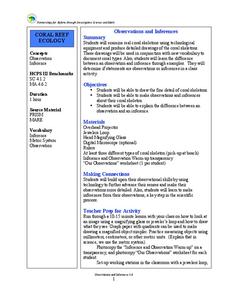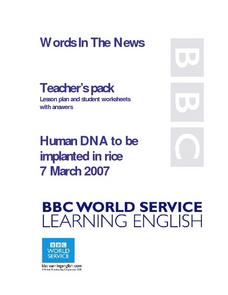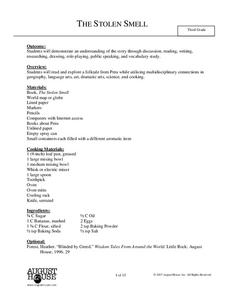Curated OER
Motion in Fluids
Students explore physical science by participating in a science activity. In this liquids lesson, students discuss how fluids can be affected by motion unlike solids. Students define other scientific vocabulary terms and conduct a motion...
Curated OER
The Ozone Layer
High schoolers examine the issue of ozone depletion. They define key vocabulary terms, take a pre-quiz, discuss the quiz questions and answers, read an article, and answer discussion questions.
Curated OER
Plant Dissection
Students study plant parts and their functions in a dissection activity. In this plant dissection lesson, students use several handouts to help them learn parts of the plant and their functions. Students then dissect flowers in groups...
Curated OER
Organ Systems: Excretory, Digestive, Immune, and Nervous
Eighth graders identify and describe the components of various body systems. They create vocabulary flash cards identifying the excretory, digestive, immune, and nervous systems and describing their functions. Students complete a...
Curated OER
Genetics
Students explain the difference between dominant and recessive genes, identify what causes differences in the traits of parents and their offspring, and explain how sex is determined. They will also improve their reading and...
Curated OER
Seasons
Pupils identify and define the vocabulary words: summer, spring, fall, and rotation. They describe how the earth's rotation affects the seasons. Students match appropriate clothing with each season. They discuss why a particular...
Curated OER
Butterfly Metamorphosis Booklet
Students study the four different stages of butterfly metamorphosis, In this butterfly life cycle instructional activity, students construct a metamorphosis booklet by recording and illustrating the butterfly life cycles in the booklet....
Curated OER
Night of the Twister
Young scholars use reading strategies for Night of the Twister. In this reading strategies lesson, students name five major catastrophes and books about each. Young scholars complete a vocabulary section, make inferences and predictions,...
Curated OER
Observations and Inferences
Learners examine coral skeletons. In this science lesson, view real coral skeletons. Students explain the differences between an observation and an inference. Learners draw a coral skeleton.
Curated OER
Words in the News-Human DNA to be Implanted in Rice
Middle schoolers examine new vocabulary words from a news report about human DNA being implanted in rice and grown in Kansas. Students read the article and discuss the vocabulary terms as well as take a quiz and complete a worksheet to...
Curated OER
The Stolen Smell
Third graders read the story The Stolen Smell, and complete language arts activities based on the book. In this The Stolen Smell lesson plan, 3rd graders complete activities such as discussion, reading, researching, drawing, role...
Curated OER
Digestion - Part 3
Learners explore the human body by reviewing the digestive system. For this human anatomy lesson, students identify the elements of human digestion by completing two body system worksheets. Learners read the story What Happens to a...
Curated OER
Respiratory System
Students identify the parts of the respiratory system and how they interact. They define vocabulary words and draw an outline of themselves and label the parts of the respiratory system. They distinguish between healthy and unhealthy...
Curated OER
Growth and Changes in Plants
Learners investigate the growth and changes in plants. They view a video and discuss the changes in plants. They work in small groups to demonstrate vocabulary words to the class. They visit a green house and take pictures of plants to...
Curated OER
Scientific Method
Middle schoolers listen to a lecture on scientific method, make vocabulary books containing at least fourteen related terms, complete a lab activity and worksheet, then create a poster detailing how scientific method works.
Curated OER
Showing Nature's Way-Plant Development and the Plant Parts We Eat
Students explore plant life. In this science lesson plan, students demonstrate and record the stages of plant growth and categorize food plants by identifying the edible part.
Other popular searches
- Space Science Vocabulary
- Earth Science Vocabulary
- Food Science Vocabulary
- Science Vocabulary Games
- Vocabulary Forensic Science
- Physical Science Vocabulary
- Life Science Vocabulary
- Science Vocabulary Portfolio
- Vocabulary Exercises Science
- Science Vocabulary Puzzle
- Science Vocabulary Lesson
- Science Vocabulary Polymers

















